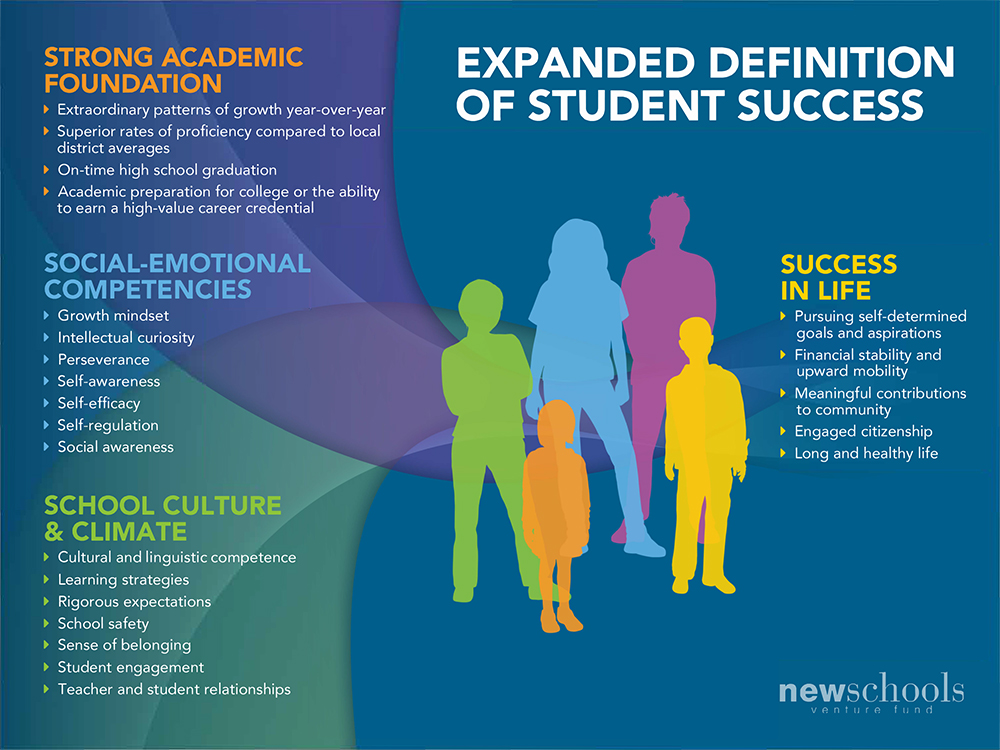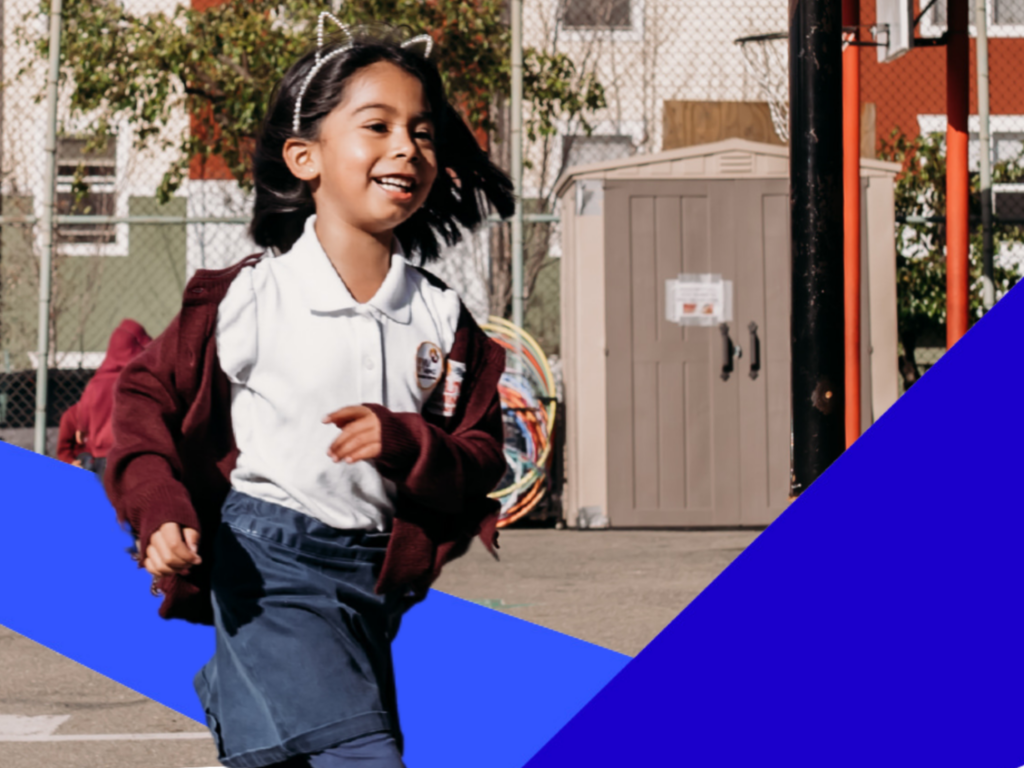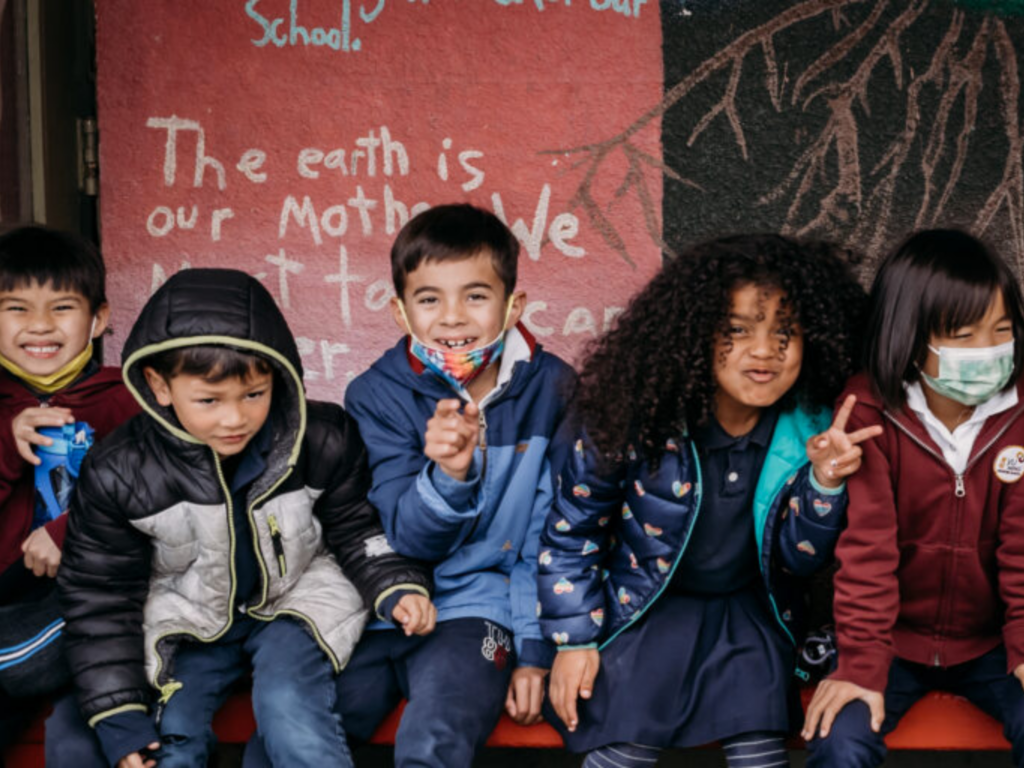In February 2019, NewSchools launched the Expanded Definition of Student Success Ed Tech Challenge – open to entrepreneurs developing technology-enabled learning experiences, instructional content, learning diagnostics, administrative tools, and other products that promote an expanded definition of student success by enhancing academic and social-emotional learning and supporting the development of nurturing school and classroom environments.
Why an Expanded Definition of Student Success?
The importance of an expanded definition of student success
Every young person in America deserves to finish high school prepared and inspired to create and live a good life, full of opportunity, choices, connection, and meaning. To reach this aspiration, students need to develop a strong academic foundation as well as other important mindsets, habits and skills. For the past few years, NewSchools has worked closely with our Innovative Schools portfolio to identify and measure an expanded definition of student success. At the same time, education leaders across the country are calling for “a more balanced approach to learning” that is “fundamentally social, emotional, and cognitive,” “acknowledges children are learning all the time,” and “encompasses the broad set of skills, knowledge, and competencies that every student needs to be a lifelong learner, productive worker, and engaged citizen” (The Aspen Institute, 2019). Given the surge in related interest and activities in the field, we decided to conduct market research to determine what role technology might play in supporting an expanded definition of student success. As with prior Ignite challenges, we realize that ed tech alone cannot solve the issues faced by students and teachers. Nonetheless, our conversations with educators and researchers began to uncover several ways that technology might enhance efforts to increase equity and improve academic outcomes by supporting the development of social-emotional competencies as well as improvements in school culture and climate.
Critical student needs: How technology can support an expanded definition of student success
We conducted market research – including conversations with students, educators, and researchers from across the country – to learn more about the role of technology in supporting an expanded definition of student success. Based on this research, we believe the most promising ed tech innovations will support the development of a range of social-emotional competencies, cognitive skills, and attributes of positive learning environments. In doing so, we expect that challenge winners will address one or more critical area of student need:
- Promoting school readiness and skills that enable successful school transitions;
- Integrating social-emotional development into core academic learning;
- Enabling new ways to measure and analyze an expanded set of student outcomes; and
- Building teachers’, parents’, and communities’ capacity to support an expanded definition of student success.
NewSchools worked with our Innovative Schools portfolio to identify seven mindsets, habits, and skills as well as seven school culture and climate factors, which along with academic outcomes make up our expanded definition of student success. For this challenge, we will consider ed tech that addresses these or other areas that are “meaningful, measurable, and malleable” – for example, tools designed to support executive function skills like working memory or cognitive flexibility.
Spurring innovation in education technology
Our virtual accelerator program offers an opportunity for the most promising companies and nonprofit organizations working in this space to learn, connect and grow together. In addition to grant funding, challenge winners receive feedback and hands-on support from best-in-class entrepreneurs, educators, researchers and other experts.
* * *
The importance of an expanded definition of student success
Every young person in America deserves to finish high school prepared and inspired to create and live a good life, full of opportunity, choices, connection, and meaning. To reach this aspiration, students need to develop a strong academic foundation as well as other important mindsets, habits and skills. For the past few years, NewSchools has worked closely with our Innovative Schools portfolio to identify and measure an expanded definition of student success. At the same time, education leaders across the country are calling for “a more balanced approach to learning” that is “fundamentally social, emotional, and cognitive,” “acknowledges children are learning all the time,” and “encompasses the broad set of skills, knowledge, and competencies that every student needs to be a lifelong learner, productive worker, and engaged citizen” (The Aspen Institute, 2019). Given the surge in related interest and activities in the field, we decided to conduct market research to determine what role technology might play in supporting an expanded definition of student success. As with prior Ignite challenges, we realize that ed tech alone cannot solve the issues faced by students and teachers. Nonetheless, our conversations with educators and researchers began to uncover several ways that technology might enhance efforts to increase equity and improve academic outcomes by supporting the development of social-emotional competencies as well as improvements in school culture and climate.
There is a growing awareness among students, parents, educators, researchers, and employers about the importance of a range of mindsets, habits, and skills that support and expand on academic success. These interconnected competencies equip students to pursue self-determined goals, attain financial stability and social mobility, contribute to their communities, engage as citizens, and lead long and healthy lives. An enhanced focus on social-emotional development as well as school culture and climate can also help students overcome equity-related barriers and increase teachers’ capacity to support an expanded set of outcomes:
At its foundation, equity in education requires a physically and emotionally safe and positive school climate in which students are respected and encouraged by adults who hold high expectations. This culture of achievement saturates all aspects of the school, featuring an environment for learning that is culturally responsive and that challenges adults and students to have a strong sense of self-efficacy. In addition, such school climates encourage students and teachers to bring thoughtful debate, listen to and learn from others’ perspectives, and disagree with one another (as well as adults) without fear of reprisal or recrimination. (Duffell et al, 2017)
Ultimately, an equity-informed approach can encourage the incorporation of students’ cultural assets into the learning process, promoting strength-based identity and community development, inside and outside of the classroom.
These skills are also connected to qualities of the learning environment, which can enable students to build deep and trusting relationships with peers and adults. School culture and climate influence “the quality and character of school life” through a combination of “norms, goals, values, interpersonal relationships, teaching and learning practices, and organizational structures” (National School Climate Center, 2018). Expanding the definition of student success can be a challenging proposition for educators working to make the most of limited instructional time, often within organizational cultures that focus on a relatively narrow set of outcomes. On the other hand, education leaders who prioritize positive learning environments can promote feelings of safety, engagement, and respect, setting a foundation for the inclusion of diverse perspectives from students, teachers, and community members within the development of a shared vision of success.

In one way or another, many schools are expanding their definitions of student success, employing varying terms including “social-emotional learning,” “whole child development,” “21st century skills,” “character education,” “soft skills,” “nonacademic skills,” “noncognitive skills,” and others. The American Institutes for Research has identified 136 different SEL-related taxonomies; the Taxonomy Project at Harvard University is working to map how these align and diverge. Amid this complexity, educators who are working to support students’ academic and social-emotional development are seeking guidance about how to focus on a manageable set of essential mindsets, habits, and skills. One useful approach is represented by the Three M framework, which asks whether a given skill or attribute is “immediately actionable for schools” by considering whether it is “Meaningful” (“predicts important long-term life outcomes and short-term academic outcomes”), “Measurable” (“can be assessed in ways that are valid, reliable, and feasible”), and “Malleable” (“can be shaped by specific interventions”) (Transforming Education, 2015).
The Expanded Definition of Student Success Ed Tech Challenge is open to entrepreneurs developing technology-enabled learning experiences, instructional content, learning diagnostics, administrative tools, and other products that promote an expanded definition of student success by enhancing academic and social-emotional learning and supporting the development of nurturing school and classroom environments. Special consideration will be given to tools that are accessible and usable by students from low-income households, Black and Latino students, English Language Learners, students with disabilities, and students from rural areas – as well as products aligned with relevant research on learning and advances in mobile and social technologies.
* * *
Critical student needs: How technology can support an expanded definition of student success

We conducted market research – including conversations with students, educators, and researchers from across the country – to learn more about the role of technology in supporting an expanded definition of student success. Based on this research, we believe the most promising ed tech innovations will support the development of a range of social-emotional competencies, cognitive skills, and attributes of positive learning environments. In doing so, we expect that challenge winners will address one or more critical area of student need:
- Promoting school readiness and skills that enable successful school transitions;
- Integrating social-emotional development into core academic learning;
- Enabling new ways to measure and analyze an expanded set of student outcomes; and
- Building teachers’, parents’, and communities’ capacity to support an expanded definition of student success.
NewSchools worked with our Innovative Schools portfolio to identify seven mindsets, habits, and skills as well as seven school culture and climate factors, which along with academic outcomes make up our expanded definition of student success. For this challenge, we will consider ed tech that addresses these or other areas that are “meaningful, measurable, and malleable” – for example, tools designed to support executive function skills like working memory or cognitive flexibility.
We provide additional information on each of the critical student needs in the sections below.
Promoting school readiness and skills that enable successful school transitions
Executive function and self regulation skills – which in turn rely on brain functions including working memory, cognitive flexibility, and inhibitory control – have been shown to be “crucial for learning and development” from an early age (Center on the Developing Child, 2018). Throughout school and life, these skills form the foundation for goal-directed behavior including learning. Research shows that Kindergarten teachers believe that such “nonacademic skills” are the most important component of school readiness (Hustedt et al, 2017). Adolescents and young adults also benefit from opportunities to develop “sophisticated emotional intelligence […] that is crucial to navigating the adult social world” (Geller, 2013). Indeed, there are opportunities for ed tech to help students across the PreK-12 spectrum build and refine these foundational skills for learning, especially in support of critical transitions into Kindergarten, middle school, high school, college, and employment.
Integrating social-emotional development into core academic learning
Educators and researchers also see an opportunity for an expanded range of mindsets, habits, and skills to be developed by students through technology-enabled learning experiences that are tightly integrated with core academic content. In many cases, this goal is aligned with best practices in instruction: For example, social-emotional learning competencies are “inextricably linked” with rigorous state math standards (Dana Center, 2016). Similarly, there are opportunities to facilitate high-quality learning experiences aligned with rigorous state English Language Arts standards while also practicing skills like “label[ing] and recogniz[ing] own and others’ emotions,” “cultivat[ing] relationships with those who can be resources when help is needed,” “demonstrat[ing] leadership skills when necessary,” and “reflect[ing] on how current choices affect the future” (Zakrzewski, 2014). Across a range of subject areas, educators are embracing opportunities to emphasize the development of “a broad array of skills, attitudes, character traits, and values” that empower students throughout school and life (Aspen Institute, 2019).
Enabling new ways to measure and analyze an expanded set of student outcomes
Technology also holds the potential to help educators make sense of data in new ways, creating insights and inspiring action in support of an expanded definition of student success. Schools’ use of SEL-related assessments should be “grounded by a clear and well-founded purpose,” often some combination of “contribut[ing] to well-informed decision making,” “communicat[ing] regularly with diverse audiences,” and “accountability to state [or local] standards” (AIR, 2015). In any case, it’s critical to recognize the limitations of these assessments, and to avoid using them in ways that result in students or schools being punished, labeled, or otherwise stigmatized. With these considerations in mind, most principals believe that social-emotional competencies can and should be measured in some way, supporting uses such as “identifying students needing intervention,” “evaluating SEL program effectiveness,” “sharing the data with parents,” and “improving teacher instruction” (DePaoli et al, 2017). Similarly, the ability to understand and respond to shifts in school culture and climate can be an important precursor to supporting individual students’ social-emotional growth. Self-report surveys, interviews, observations, performance tasks, and the use of learning artifacts like portfolios and journals will all likely play some role in emerging efforts to understand how students develop over time across a range of mindsets, habits, and skills.
Building teachers’, parents’, and communities’ capacity to support an expanded definition of student success
Nearly all teachers believe that social-emotional learning is an important part of the school experience, yet many school leaders also report a need for increased guidance and support in order to broadly implement an expanded definition of student success. In addition to enhanced professional development and training, teachers could also benefit from seamless access to targeted, research-based instructional strategies. Technology holds the potential to support educators as they build their own social-emotional learning skills, as well as effectively implement student-facing experiences that are “grounded in [SEL] theory, principles, and strategies” (CASEL, 2006). There are also opportunities to connect SEL with community-based service learning, helping students create a “bridge between school and home” while promoting the practice of skills such as “lead[ing] with integrity, govern[ing] fairly, analyz[ing] problems, and work[ing] collectively with people different from themselves” (McKay-Jackson, 2014).



